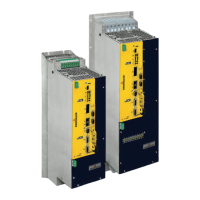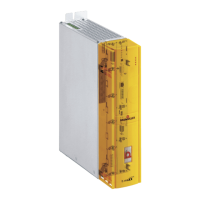NMT_CS_NOT_ACIVE Transient state for starting the CN and for identify-
ing in the network
NMT_CS_PRE_OPERATIONAL_1 Identification of the node by the MN via IdentRe-
quest
NMT_CS_PRE_OPERATIONAL_2 PDO configuration by the MN; configuration
examination
NMT_CS_READY_TO_OPERATE Signalizing the service readiness to the MN;
Starting the PDO communication
NMT_CS_OPERATIONAL Normal operating state of the CN; CN takes part
at the cyclic data exchange
NMT_CS_STOPPED CN is passive; controlled shut down of the CN; CN
does not take part at the cyclic data exchange
NMT_CS_BASIC_ETHERNET CN takes part at usual ethernet communication
according to IEEE 802.3
Service data (SDO)
Application Manual POWERLINK Controlled Node
Document no. 5.13013.04 Baumüller Nürnberg GmbH
32
of 80
5.3
5.3 Service data (SDO)
Service data objects (SDO) serve as an exchange of messages without real-time re-
quests. SDOs are used for parameterizing CNs and for setting the communication refer-
ences for PDOs. Access on data occurs only
via the object list. SDOs are always
acknowledged data, i. e. the transmitter receives an acknowledge from the receiver. The
da
ta exchange by means of SDOs can only be executed asynchronously (see also ZSyn-
chronization (SYNC)– fr
om page 36).
SDOs follow the client-ser
ver-model. The client (MN) initiates the communication and the
server (CN) responds to it. A server is not able to start a SDO communication. The
Baumüller POWERLINK option module supports a server SDO but no client SDO.
The MN starts the asynchronous cycle by sending the Start of Asynchronous (SoA)
fr
ame. The SDO transfer is answered by the CN via ASnd.
State Description
